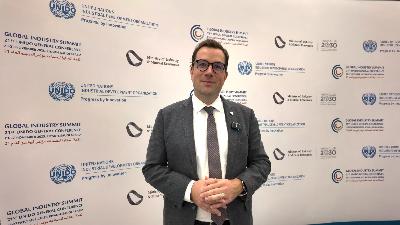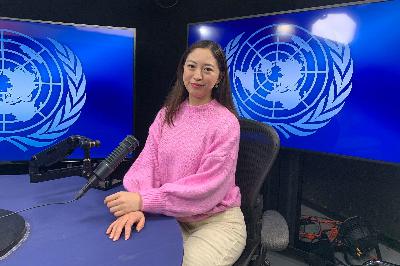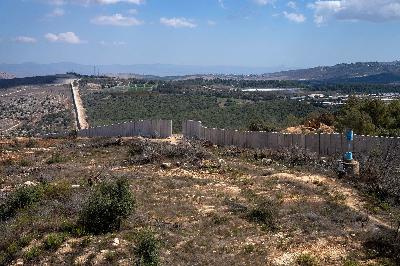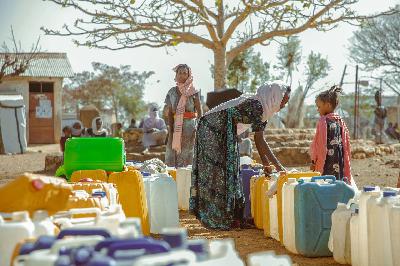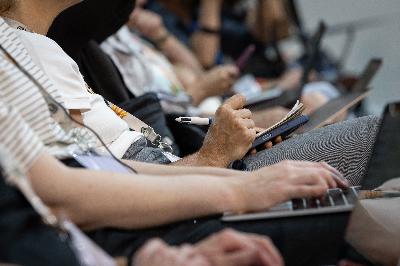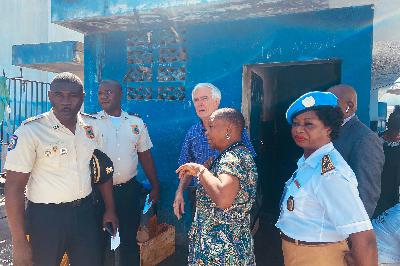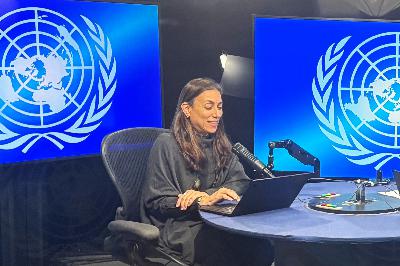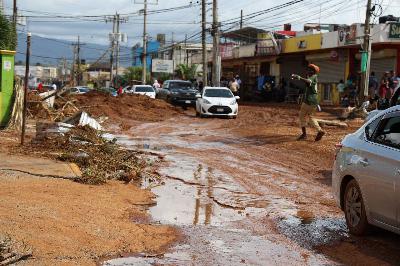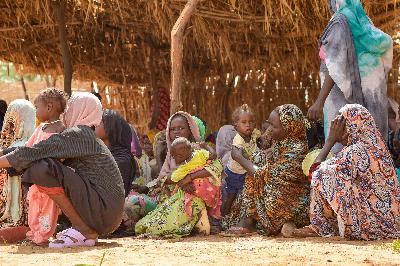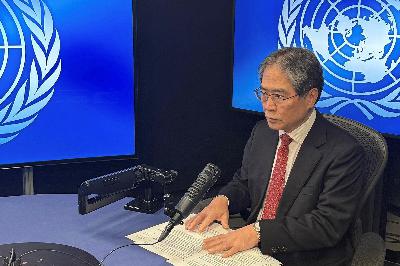Discover UN Interviews
UN Interviews

UN Interviews
Author: United Nations
Subscribed: 60Played: 1,463Subscribe
Share
Description
UN News interviews a wide range of people from senior news-making officials at Headquarters in New York, to advocates and beneficiaries from across the world who have a stake in helping the UN go about its often life-saving work in the field.
334 Episodes
Reverse
The United Nations Industrial Development Organization (UNIDO) may not have the same profile as some of the better know agencies within the system, but it is punching above its weight in terms of its impact on the economies of the developing world.At UNIDO’s Global Industry Summit in Riyadh, Saudi Arabia, UN News’s Khaled Mohamed spoke to Manuel Mattiat, the agency’s Chief of Cabinet, about the crucial role his organization plays in helping industrialized countries to invest in emerging economies, raising living standards for all.
Reducing inequality in Nepal remains a major challenge, as the co untry continues to struggle to meet its Sustainable Development Goal (SDG) targets.Among those tackling this issue is Aishworya Shrestha, a young Nepali social worker recently named a UN Young Leader for the SDGs.Ms. Shrestha leads community-driven mental health and empowerment programmes in some of Nepal’s most remote areas and works to engage young people around the world in advancing the SDGs.The 17 Sustainable Development Goals, adopted by all UN Member States in 2015 aim to create a fairer, healthier, and more sustainable world.Each year, 17 Young Leaders are selected globally to help inspire action and accelerate progress toward these shared goals.UN News’s Charlotte Frantz spoke with Ms. Shrestha about what this recognition means to her and how she plans to leverage the role to create meaningful change.
During his visit to Barcarena in the Amazon basin – a UN-recognized Resilience Hub – the UN’s disaster risk reduction chief, Kamal Kishore, has been seeing climate resilience first hand; not just through infrastructure, but through imagination, education, and community-driven action.The top official is at COP30 in Belém and told UN News that from flood and heat-resilient schools – to empowered children shaping their own future – Barcarena demonstrates how local leadership can inspire global transformation.Speaking to Felipe de Carvalho who’s also on the ground there, he praised the local school as “a guiding light” for climate adaptation, one he hopes to see replicated “at least 100,000” times worldwide.
On Sunday, a foot patrol of the United Nations Interim Force in Lebanon (UNIFIL) was targeted by an Israeli army Merkava tank positioned inside Lebanese territory. Israel said it had been a case of “misidentification”.UN News’s Nancy Sarkis spoke to UNIFIL spokesperson Kandice Ardiel, who said the incident is part of a “deeply worrying escalation” along the Blue Line of separation.Ms. Ardiel pointed to warning fire near civilians and new Israeli-built concrete walls that straddle the Blue Line, stressing that “any attack on peacekeepers is unacceptable.”
Last year, 37,000 stolen cultural objects – including artifacts, artworks, coins, and instruments – were seized by international police agency, Interpol, and law enforcement.The illicit trade in cultural property is one of the world’s oldest and most profitable forms of criminal activity – and it is increasingly being facilitated online. UN News’s Cristina Silveiro has been speaking to Krista Pikkat, Director for Culture and emergencies for UN agency UNESCO, about the fight against illicit trafficking in stolen heritage worldwide.
As COP30 brings leaders and negotiators together from around the world, the spotlight is not only on policy but also on the real-life experiences of those most affected by climate change.From Ethiopia, Mekebib Tadesse, representing the UN refugee agency (UNHCR) delegation, brings a firsthand perspective on the human and humanitarian dimensions of the crisis.In an interview with Felipe Carvalho – who's in Belem for UN News – Mekebib shared insights on how climate change is upending his home country.
Climate change is no longer a distant threat; it is already reshaping lives and communities around the world.Extreme weather – from unprecedented tornadoes to rising seas and creeping desertification – is forcing millions on the run, often within their own countries.At COP30 in Belém this week, Ugochi Daniels, Deputy Director General of the International Organization for Migration (IOM), stressed the importance of local, people-centred solutions.“Early warning systems, predictable funding, and locally led adaptation are critical,” she told UN News’s Felipe de Carvalho.
At a time when false narratives about climate change are spreading faster than ever online, the UN education and culture agency, UNESCO, is calling for stronger global cooperation to safeguard information integrity.Speaking to UN News’s Felipe de Carvalho in Brazil’s coastal city of Belém which is hosting COP30, Guilherme Canela, UNESCO’s Head of Digital Policies who takes a lead on promoting accurate information regarding climate change, says misinformation has become one of the most significant global risks – alongside climate change itself.He stressed that protecting reliable, science-based information is essential for effective climate action.
Filipinos are picking up the pieces after super typhoon Fung-Wong ripped through the country.Eight people including three children are reported to have died because of the typhoon, but it could have been much worse: over a million people were evacuated from homes in 13 of the country’s 18 regions, in one of the Philippines’ largest ever pre-emptive operations.Arnaud Peral, the UN Resident Coordinator in The Philippines, told UN News’s Conor Lennon the way authorities prepared for the impact is testament to the coordination between the government, the United Nations and the international NGOs on the ground.
People being held in prisons in Haiti are dying of starvation in subhuman conditions according to the UN’s Designated Expert on the human rights situation in the Caribbean island nation, William O'Neill.Haiti is facing an increasingly perilous security crisis as gangs compete to control the capital, Port-au-Prince, and surrounding areas, impacting an already dysfunctional justice system.Prisons are severely overcrowded, and some detainees can wait for years to be tried for minor offences, including the theft of chickens or shoes.Daniel Dickinson began by asking Mr. O’Neill to describe the conditions he has witnessed in Haitian prisons.
With half the world’s population under 30, sidelining young people is no longer an option. That’s according to UN Assistant Secretary-General for Youth Affairs, Felipe Paullier, who champions the determination and creativity of the world’s youth.He’s been at the World Summit for Social Development in Doha this week, issuing a strong call to action and urging world leaders to put young people at the heart of decision-making.In an interview with UN News’s Abdelmonem Makki, he said that real progress means making space, so young people have a main seat at the table: “They’re not waiting for us,” he adds, “they’re finding solutions.”
For millions of people with disabilities around the globe, the World Social Summit happening in Doha this week, represents something more powerful than promises – it represents hope.That’s according to Fatma Al Jassim, who is in Doha representing the Global Disability Innovation Hub, a pioneering research centre in the UK, dedicated to driving disability innovation for a fairer world.Speaking to UN News’s Abdelmonem Makki, Ms. Al Jassim explained why true inclusion is key to real change.
Nearly 30 years after the landmark Copenhagen Declaration – when governments pledged to make societies fairer and more inclusive – conversations about putting social development back at the centre of the global agenda have taken on renewed importance.To understand why it’s so critical, and how social protection connects to the broader pursuit of social justice, UN News’s Vibhu Mishra has been speaking to Srinivas Tata, of the UN Economic and Social Commission for Asia and the Pacific (ESCAP).They’re both in Doha where the Second World Summit for Social Development is in full swing, and Mr. Tata began by explain why social justice is not just a vague concept – but an achievable goal.
Thirty years after the first World Social Summit in Copenhagen, global leaders have reconvened in Doha to assess progress and chart a path forward on poverty eradication and social development.Over the past three decades, 1.5 billion people have been lifted out of poverty, and global life expectancy has increased by nearly seven years.However, significant challenges remain, with an estimated 800 million people still living in extreme poverty, according to the United Nations Development Programme (UNDP).Speaking on the role of the UN and on the actions that governments must take to make social development more resilient and sustainable, UNDP’s acting administrator Haoling Xu underscored the importance of rebuilding global trust and solidarity.He spoke to UN News’ Abdelmonem Makki following the political declaration adoption at the World Summit for Social Development on Tuesday.UN News continues to provide on-the-ground coverage from Doha.
The Women, Peace and Security (WPS) Agenda – launched 25 years ago through Security Council resolution 1325 – recognized women are affected by wars in specific ways and must also play a distinct role in resolving them.Mexico, Chile and Colombia have all adopted foreign policies which emphasise gender equality in diplomacy, peacebuilding and development – but more needs to be done for women to be meaningfully included in peace processes and conflict resolution. UN News’s Ileana Exaras spoke to Laura Flores, Director of the Americas Division in the UN’s political affairs and peacebuilding department, about the progress and challenges that continue to affect women in politics across Latin America.
Getting relief to communities in Jamaica cut off by the devastation caused by Hurricane Melissa remains the “main challenge” for UN aid agencies in the Caribbean country.The hurricane tore through the western part of the island — damaging homes, roads, and hospitals, cutting off access to some of the hardest-hit communities.The United Nations team in Jamaica, working alongside the government and local partners, is focusing on providing urgent support — from food, water, and shelter to restoring health services and rebuilding critical infrastructure.UN News' Charlotte Frantz asked Dennis Zulu, the UN’s Resident coordinator and most senior official in Jamaica, about the immediate priorities on the ground.
In a world grappling with growing inequalities, demographic shifts, and the fast pace of technological and environmental change, the Second World Summit for Social Development is bringing leaders together in Doha to talk and take action.Thirty years after the landmark Copenhagen Summit, the mission remains the same: to build a world where progress is measured not just in wealth, but in well-being, equality, and human dignity.Throughout the week, UN News will be on the ground in Doha, bringing you live updates, in-depth reporting, and exclusive interviews.Ahead of the Summit, UN News’s Vibhu Mishra sat down with Bjørg Sandkjær, Assistant Secretary-General for Policy Coordination, to discuss the priorities and expectations for global social development.
Horrifying videos and reported atrocities allegedly carried out by RSF militia in and around the Sudanese city of El Fasher demonstrate a “total disregard” for both protection of civilians and the Security Council’s resolution demanding an end to the civil war.That’s according to the UN’s head of humanitarian operations in the country, Denise Brown, who told UN News after recently visiting the Darfur region before the fall of the city this week, that it’s proving hard to verify information from the stricken city due to a communications blackout.She told Ezzat El-Ferri she feels a “huge sense” of tragedy and responsibility to continue providing UN relief services, adding that the atrocities must be documented so that “justice can be served.”
While the International Court of Justice (ICJ) is not “blind” to political context or the human suffering behind many cases, its main job is to be the interpreter of international law in disputes between States, said the newly appointed President of the UN World Court, Yuji Iwasawa.This year, ICJ issued two advisory opinions that made headlines: one that decided Israel must allow aid to flow freely into Palestine and another ruling that countries have a responsibility to protect the environment.Mr. Iwasawa spoke to UN News’s Ileana Exaras about the functions and responsibilities of the court, the significance of advisory opinions and what he’d like to accomplish throughout his tenure.
As airstrikes and conflict continue to devastate communities across Ukraine, the UN Children’s Fund, UNICEF, is raising urgent concerns about the mental health and well-being of the country’s children.Kenan Madi, Chief of Field Operations for UNICEF in Ukraine, warns that the war is leaving thousands of children without homes, heat, power, or access to basic services, making everyday life “extremely difficult.”Education has also been severely disrupted.Despite ongoing efforts, UNICEF’s appeal for Ukraine remains only partially funded, leaving millions of children at risk as another harsh winter looms.UN News’s Nargiz Shekinskaya started by asking Mr. Madi what are the main needs of the children living on the frontlines of the conflict.


